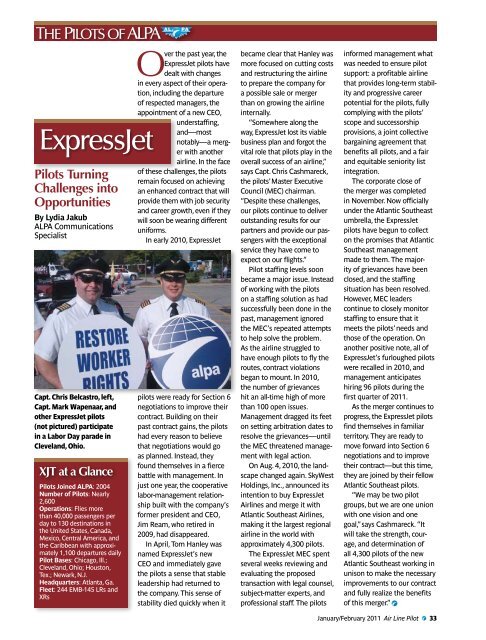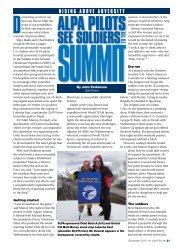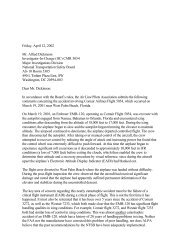The Pilots of ALPA - Air Line Pilots Association
The Pilots of ALPA - Air Line Pilots Association
The Pilots of ALPA - Air Line Pilots Association
Create successful ePaper yourself
Turn your PDF publications into a flip-book with our unique Google optimized e-Paper software.
THE PILOTS OF <strong>ALPA</strong><br />
ExpressJet<br />
<strong>Pilots</strong> Turning<br />
Challenges into<br />
Opportunities<br />
By Lydia Jakub<br />
<strong>ALPA</strong> Communications<br />
Specialist<br />
Capt. Chris Belcastro, left,<br />
Capt. Mark Wapenaar, and<br />
other ExpressJet pilots<br />
(not pictured) participate<br />
in a Labor Day parade in<br />
Cleveland, Ohio.<br />
XJT at a Glance<br />
<strong>Pilots</strong> Joined <strong>ALPA</strong>: 2004<br />
Number <strong>of</strong> <strong>Pilots</strong>: Nearly<br />
2,600<br />
Operations: Flies more<br />
than 40,000 passengers per<br />
day to 130 destinations in<br />
the United States, Canada,<br />
Mexico, Central America, and<br />
the Caribbean with approximately<br />
1,100 departures daily<br />
Pilot Bases: Chicago, Ill.;<br />
Cleveland, Ohio; Houston,<br />
Tex.; Newark, N.J.<br />
Headquarters: Atlanta, Ga.<br />
Fleet: 244 EMB-145 LRs and<br />
XRs<br />
Over the past year, the<br />
ExpressJet pilots have<br />
dealt with changes<br />
in every aspect <strong>of</strong> their operation,<br />
including the departure<br />
<strong>of</strong> respected managers, the<br />
appointment <strong>of</strong> a new CEO,<br />
understaffing,<br />
and—most<br />
notably—a merger<br />
with another<br />
airline. In the face<br />
<strong>of</strong> these challenges, the pilots<br />
remain focused on achieving<br />
an enhanced contract that will<br />
provide them with job security<br />
and career growth, even if they<br />
will soon be wearing different<br />
uniforms.<br />
In early 2010, ExpressJet<br />
pilots were ready for Section 6<br />
negotiations to improve their<br />
contract. Building on their<br />
past contract gains, the pilots<br />
had every reason to believe<br />
that negotiations would go<br />
as planned. Instead, they<br />
found themselves in a fierce<br />
battle with management. In<br />
just one year, the cooperative<br />
labor-management relationship<br />
built with the company’s<br />
former president and CEO,<br />
Jim Ream, who retired in<br />
2009, had disappeared.<br />
In April, Tom Hanley was<br />
named ExpressJet’s new<br />
CEO and immediately gave<br />
the pilots a sense that stable<br />
leadership had returned to<br />
the company. This sense <strong>of</strong><br />
stability died quickly when it<br />
became clear that Hanley was<br />
more focused on cutting costs<br />
and restructuring the airline<br />
to prepare the company for<br />
a possible sale or merger<br />
than on growing the airline<br />
internally.<br />
“Somewhere along the<br />
way, ExpressJet lost its viable<br />
business plan and forgot the<br />
vital role that pilots play in the<br />
overall success <strong>of</strong> an airline,”<br />
says Capt. Chris Cashmareck,<br />
the pilots’ Master Executive<br />
Council (MEC) chairman.<br />
“Despite these challenges,<br />
our pilots continue to deliver<br />
outstanding results for our<br />
partners and provide our passengers<br />
with the exceptional<br />
service they have come to<br />
expect on our flights.”<br />
Pilot staffing levels soon<br />
became a major issue. Instead<br />
<strong>of</strong> working with the pilots<br />
on a staffing solution as had<br />
successfully been done in the<br />
past, management ignored<br />
the MEC’s repeated attempts<br />
to help solve the problem.<br />
As the airline struggled to<br />
have enough pilots to fly the<br />
routes, contract violations<br />
began to mount. In 2010,<br />
the number <strong>of</strong> grievances<br />
hit an all-time high <strong>of</strong> more<br />
than 100 open issues.<br />
Management dragged its feet<br />
on setting arbitration dates to<br />
resolve the grievances—until<br />
the MEC threatened management<br />
with legal action.<br />
On Aug. 4, 2010, the landscape<br />
changed again. SkyWest<br />
Holdings, Inc., announced its<br />
intention to buy ExpressJet<br />
<strong>Air</strong>lines and merge it with<br />
Atlantic Southeast <strong>Air</strong>lines,<br />
making it the largest regional<br />
airline in the world with<br />
approximately 4,300 pilots.<br />
<strong>The</strong> ExpressJet MEC spent<br />
several weeks reviewing and<br />
evaluating the proposed<br />
transaction with legal counsel,<br />
subject-matter experts, and<br />
pr<strong>of</strong>essional staff. <strong>The</strong> pilots<br />
informed management what<br />
was needed to ensure pilot<br />
support: a pr<strong>of</strong>itable airline<br />
that provides long-term stability<br />
and progressive career<br />
potential for the pilots, fully<br />
complying with the pilots’<br />
scope and successorship<br />
provisions, a joint collective<br />
bargaining agreement that<br />
benefits all pilots, and a fair<br />
and equitable seniority list<br />
integration.<br />
<strong>The</strong> corporate close <strong>of</strong><br />
the merger was completed<br />
in November. Now <strong>of</strong>ficially<br />
under the Atlantic Southeast<br />
umbrella, the ExpressJet<br />
pilots have begun to collect<br />
on the promises that Atlantic<br />
Southeast management<br />
made to them. <strong>The</strong> majority<br />
<strong>of</strong> grievances have been<br />
closed, and the staffing<br />
situation has been resolved.<br />
However, MEC leaders<br />
continue to closely monitor<br />
staffing to ensure that it<br />
meets the pilots’ needs and<br />
those <strong>of</strong> the operation. On<br />
another positive note, all <strong>of</strong><br />
ExpressJet’s furloughed pilots<br />
were recalled in 2010, and<br />
management anticipates<br />
hiring 96 pilots during the<br />
first quarter <strong>of</strong> 2011.<br />
As the merger continues to<br />
progress, the ExpressJet pilots<br />
find themselves in familiar<br />
territory. <strong>The</strong>y are ready to<br />
move forward into Section 6<br />
negotiations and to improve<br />
their contract—but this time,<br />
they are joined by their fellow<br />
Atlantic Southeast pilots.<br />
“We may be two pilot<br />
groups, but we are one union<br />
with one vision and one<br />
goal,” says Cashmareck. “It<br />
will take the strength, courage,<br />
and determination <strong>of</strong><br />
all 4,300 pilots <strong>of</strong> the new<br />
Atlantic Southeast working in<br />
unison to make the necessary<br />
improvements to our contract<br />
and fully realize the benefits<br />
<strong>of</strong> this merger.”<br />
January/February 2011 <strong>Air</strong> <strong>Line</strong> Pilot 33





